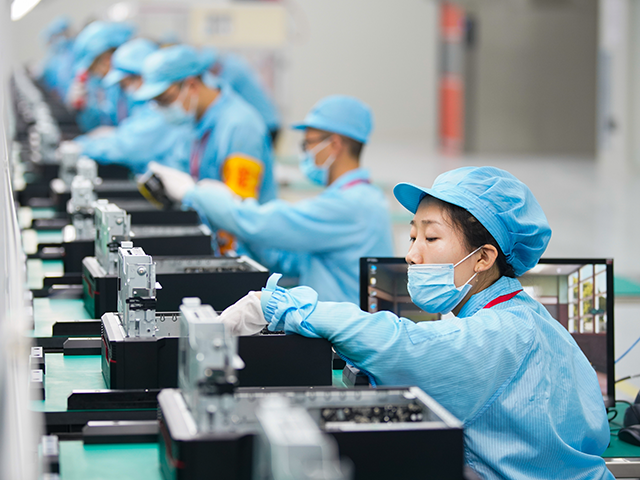Nikkei Asia on Tuesday reported that Apple will begin producing its MacBook line of laptop computers in Vietnam by mid-2023, a major step toward diversifying the company’s supply chain away from China.
Apple’s top supplier, Taiwan-based electronics firm Foxconn, is the largest foreign company operating in China, and Apple itself is Number Three, coming in just behind German automaker Volkswagen. The top 100 foreign companies in China collectively generate a trillion dollars in sales, providing seven percent of China’s Gross Domestic Product (GDP).
Most of these firms continued doing business in China despite all manner of human rights violations, from the oppression of Tibet to the genocide of the Uyghur Muslims, and they even stuck with China during the first stages of the Wuhan coronavirus pandemic — but when Chinese industry started coming apart at the seams due to endless coronavirus lockdowns, and then massive protests erupted against those lockdowns, some foreign companies began thinking more seriously about diversifying their supply chains.
A source with “direct knowledge” of Apple’s plans told Nikkei Asia that Apple asked Foxconn to shift some MacBook production to Vietnam, beginning as early as May 2023. MacBooks have the most complex supply chain of any Apple product, so it reportedly took two years of preparation to open a production line outside of China.
“After the MacBook production shifts, all of Apple’s flagship products basically will have one more production location beyond China … iPhones in India and MacBooks, the Apple Watch and iPads in Vietnam. What Apple wants now is an ‘out of China’ option for at least part of production for all of its products,” the source said.
Nikkei Asia noted other electronics and Internet companies — including HP, Dell, Google, Microsoft, Amazon, and Facebook/Meta — have implemented similar plans to diversify production and data services out of China.
Many of these plans were hatched after former President Donald Trump imposed tariffs on China and because China’s mix of cheap labor and sinister government interference began looking less attractive. The pandemic and its aftermath kicked diversification plans into higher gear, especially for Foxconn, whose gigantic iPhone assembly plant in Zhengzhou became the focus of worldwide media attention for an ugly coronavirus lockdown, an exodus of workers from the sealed facility, and riots over unpaid hiring bonuses after the plant tried to rebuild its workforce.
Taiwanese supply chain analyst Chiu Shih-fang said China’s lockdowns and the resulting public unrest clearly accelerated the diversification process.
“In the past, most people in the industry always hoped that the situation could ease and things could go back to the good old days — but this time, they realize there is no way of turning back and no matter what they need to prepare alternatives beyond China,” Chiu said.
Chinese officials have not quite given up on trying to halt or reverse diversification. On Tuesday, Commerce Minister Wang Wentao wrote an op-ed for state media in which he accused hostile foreign governments of attempting to “politicize and weaponize” the post-pandemic economy by prodding their businessmen to pull out of China.
Wang, who did not mention the story about Apple and Foxconn moving to Vietnam but must surely have been aware of it, urged Chinese firms to add more “high-value-added production” to keep their international clients happy.
Some international analysts disagree that diversification is irreversible, pointing to the long history of foreign industry in China — a fair number of factories serving outside firms are now over a hundred years old — and China’s advantages of scale, which make it difficult for up-and-coming competitors like Vietnam, India, and Brazil to lure more than a fraction of foreign business away. None of the competitors can quite match China’s industrial infrastructure, or supply quite so many skilled workers at such a low cost.
Analyst Nick Marro of the U.K.-based Economist Intelligence Unit told CNBC in November that foreign firms were fed up with China’s “on-off economy” — the off button being coronavirus lockdowns — but not enough to abandon China completely, especially if the Communist government is serious about “optimizing” its policies to avoid destructive citywide quarantines.
“We don’t expect companies to leave China. We just expect them to diversify their footprint, China plus one,” Marro said.
Marro said foreign firms remain “committed to the Chinese market,” but their commitment was sorely tested by the endless lockdowns. China’s decision in early December to begin softening its “zero-Covid” policy might have been just the signal they were looking for that the “operational environment and the macroeconomic environment will improve.”

COMMENTS
Please let us know if you're having issues with commenting.